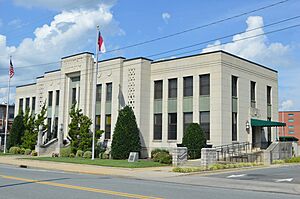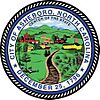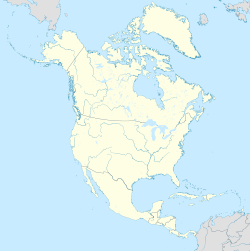Asheboro, North Carolina facts for kids
Quick facts for kids
Asheboro, North Carolina
|
||
|---|---|---|

Asheboro municipal building
|
||
|
||
| Nickname(s):
Zoo City
|
||
| Motto(s):
"Exactly where you want to be."
|
||

Location of Asheboro, North Carolina
|
||
| Country | United States | |
| State | North Carolina | |
| County | Randolph | |
| Incorporated | December 25, 1796 | |
| Named for | Samuel Ashe | |
| Area | ||
| • Total | 19.00 sq mi (49.20 km2) | |
| • Land | 18.90 sq mi (48.95 km2) | |
| • Water | 0.09 sq mi (0.24 km2) | |
| Elevation | 846 ft (258 m) | |
| Population
(2020)
|
||
| • Total | 27,156 | |
| • Density | 1,436.75/sq mi (554.73/km2) | |
| Time zone | UTC−5 (Eastern (EST)) | |
| • Summer (DST) | UTC−4 (EDT) | |
| ZIP codes |
27203-27205
|
|
| Area code(s) | 336-743 | |
| FIPS code | 37-02080 | |
| GNIS feature ID | 2403119 | |
Asheboro is a city in North Carolina, United States. It is the main city of Randolph County. In 2020, about 27,156 people lived there.
Asheboro is part of a larger area called the Piedmont Triad. This area includes the cities of Greensboro and High Point. Asheboro is also famous for being home to the North Carolina Zoo. This zoo is owned by the state of North Carolina.
Contents
History of Asheboro
Asheboro was named after Samuel Ashe. He was the ninth governor of North Carolina. The city became the main town for Randolph County in 1796.
In the 1800s, Asheboro was a small village. It had less than 200 people even during the Civil War. Its main purpose was to hold the county courthouse. The town was busiest when court was in session.
Asheboro started to grow a lot after railroads came. The first railroad arrived in 1889. Another one followed in 1896. These railroads helped the town connect with other places.
In the 1900s, Asheboro became a place where textiles were made. Textile factories make cloth and clothing. The Acme Hosiery Mills opened in 1909. After World War II, more factories opened. They made things like batteries, wires, and food. The North Carolina Zoo opened in 1974. It quickly became a major attraction.
In the early 2000s, Asheboro faced some economic challenges. This was because its old factories had more competition from other countries. However, Asheboro has become a lively city again in recent years. Many new jobs are being created there.
The city has also worked to improve housing for its residents. In 2015, Sunset Avenue in Downtown Asheboro was named a "Great Main Street." In 2016, Asheboro won the "All-America City Award." This award honors cities that find new ways to solve problems. Asheboro won for its efforts to help children be healthy and successful.
Historic Buildings in Asheboro
Many old buildings in Asheboro are important. They are listed on the National Register of Historic Places. This means they are protected because of their history.
- Acme-McCrary Hosiery Mills
- Asheboro Hosiery Mills and Cranford Furniture Company Complex
- Central School
- Wilson Kindley Farm and Kindley Mine
- Lewis-Thornburg Farm
- Mount Shepherd Pottery Site
- Randolph County Courthouse
- Sunset Theater
- Thayer Farm Site (31RD10)
Geography of Asheboro
Asheboro covers about 15.4 square miles (40 square kilometers). Most of this area is land. Asheboro is known as the center point of North Carolina.
The city is in the Piedmont plateau region. This area has gently rolling hills. Even though it's far from the Appalachian Mountains, Asheboro is quite hilly. This is because the town is in the Uwharrie Mountains. These are very old ridges and hills that have worn down over time. So, Asheboro feels more mountainous than it actually is.
Climate in Asheboro
Asheboro has a warm climate. Winters are cool, and summers are hot.
| Climate data for Asheboro, North Carolina(1991-2020 normals) | |||||||||||||
|---|---|---|---|---|---|---|---|---|---|---|---|---|---|
| Month | Jan | Feb | Mar | Apr | May | Jun | Jul | Aug | Sep | Oct | Nov | Dec | Year |
| Record high °F (°C) | 78 (26) |
82 (28) |
92 (33) |
93 (34) |
97 (36) |
103 (39) |
104 (40) |
105 (41) |
100 (38) |
96 (36) |
87 (31) |
79 (26) |
105 (41) |
| Mean daily maximum °F (°C) | 50.0 (10.0) |
54.2 (12.3) |
62.0 (16.7) |
71.5 (21.9) |
78.0 (25.6) |
84.8 (29.3) |
88.3 (31.3) |
86.5 (30.3) |
80.6 (27.0) |
71.2 (21.8) |
61.0 (16.1) |
52.8 (11.6) |
70.1 (21.2) |
| Daily mean °F (°C) | 39.7 (4.3) |
43.2 (6.2) |
50.3 (10.2) |
59.1 (15.1) |
66.6 (19.2) |
74.0 (23.3) |
77.7 (25.4) |
76.2 (24.6) |
70.1 (21.2) |
59.5 (15.3) |
49.4 (9.7) |
42.6 (5.9) |
59.0 (15.0) |
| Mean daily minimum °F (°C) | 29.4 (−1.4) |
32.1 (0.1) |
38.6 (3.7) |
46.7 (8.2) |
55.2 (12.9) |
63.2 (17.3) |
67.0 (19.4) |
65.9 (18.8) |
59.6 (15.3) |
47.8 (8.8) |
37.7 (3.2) |
32.4 (0.2) |
48.0 (8.9) |
| Record low °F (°C) | −8 (−22) |
2 (−17) |
8 (−13) |
25 (−4) |
33 (1) |
39 (4) |
45 (7) |
46 (8) |
36 (2) |
21 (−6) |
10 (−12) |
−1 (−18) |
−8 (−22) |
| Average precipitation inches (mm) | 3.95 (100) |
3.22 (82) |
4.09 (104) |
3.94 (100) |
3.76 (96) |
4.08 (104) |
4.18 (106) |
3.87 (98) |
4.84 (123) |
3.50 (89) |
3.55 (90) |
3.64 (92) |
46.62 (1,184) |
| Source: NOAA | |||||||||||||
Population of Asheboro
| Historical population | |||
|---|---|---|---|
| Census | Pop. | %± | |
| 1850 | 176 | — | |
| 1870 | 182 | — | |
| 1880 | 299 | 64.3% | |
| 1890 | 510 | 70.6% | |
| 1900 | 992 | 94.5% | |
| 1910 | 1,865 | 88.0% | |
| 1920 | 2,559 | 37.2% | |
| 1930 | 5,021 | 96.2% | |
| 1940 | 6,981 | 39.0% | |
| 1950 | 7,701 | 10.3% | |
| 1960 | 9,449 | 22.7% | |
| 1970 | 10,797 | 14.3% | |
| 1980 | 15,252 | 41.3% | |
| 1990 | 16,362 | 7.3% | |
| 2000 | 21,672 | 32.5% | |
| 2010 | 25,012 | 15.4% | |
| 2020 | 27,156 | 8.6% | |
| 2022 (est.) | 27,482 | 9.9% | |
| U.S. Decennial Census | |||
Asheboro Population in 2020
In 2020, Asheboro had 27,156 people. There were 10,841 households. About 6,130 families lived in the city.
| Race | Number | Percentage |
|---|---|---|
| White (non-Hispanic) | 14,315 | 52.71% |
| Black or African American (non-Hispanic) | 3,300 | 12.15% |
| Native American | 119 | 0.44% |
| Asian | 365 | 1.34% |
| Pacific Islander | 3 | 0.01% |
| Other/Mixed | 1,069 | 3.94% |
| Hispanic or Latino | 7,985 | 29.4% |
Economy of Asheboro
Asheboro has many different businesses. These businesses provide jobs for people in the city.
Top Employers in Asheboro
Here are some of the biggest employers in Asheboro as of 2021:
| # | Employer | # of Employees |
|---|---|---|
| 1 | Technimark | 1,500 |
| 2 | Klaussner Furniture Industries | 1,100 |
| 3 | Randolph Health | 1,084 |
| 4 | North Carolina Zoo | 630 |
| 5 | Asheboro City Schools | 620 |
| 6 | Energizer Battery | 405 |
| 7 | City of Asheboro | 330 |
| 8 | DJO Global/Elastic Therapy | 240 |
| 9 | Post Consumer Brands | 230 |
| 10 | Bossong Hosiery | 225 |
In 2012, a company called Hyosung USA closed its wire plant in Asheboro. This meant 310 jobs were lost. The plant made wires for car and truck tires.
In the mid-1990s, Black & Decker Corp was a major employer. They made a popular product called the SnakeLight. In 1998, their plant employed about 1,100 workers.
Culture in Asheboro
Sports in Asheboro
- Asheboro has a baseball team called the Asheboro ZooKeepers. They play in the Coastal Plain League. This is a summer baseball league for college players. The ZooKeepers play at McCrary Park.
- Caraway Speedway is a race track in Asheboro. It hosts races for the Whelen Southern Modified Tour.
Shopping in Asheboro
Randolph Mall is a shopping center that opened in Asheboro in 1982.
Transportation in Asheboro
Several main roads go through or near Asheboro. U.S. Route 220 and Interstate 73/Interstate 74 connect Asheboro to Greensboro. U.S. Route 64 goes around most of Asheboro. It also has a special route that goes through the city. U.S. 64 also connects Asheboro to Raleigh. North Carolina Highway 49 connects the city to Charlotte.
The Asheboro Regional Airport is used for smaller planes. For flights with passengers, the closest airport is Piedmont Triad International Airport in Greensboro.
Education in Asheboro
Public schools in Asheboro are run by Asheboro City Schools.
Fayetteville Street Christian School is a private school in Asheboro. It is the largest private school in Randolph County.
The main office for the Randolph County Schools is also in Asheboro.
Notable People from Asheboro
Many interesting people have come from Asheboro:
- Sam Ard, a former NASCAR driver. He won the NASCAR Busch Series in 1983 and 1984.
- William Johnston Armfield, a business leader and giver to charity.
- Scott Bankhead, a Major League Baseball pitcher. He was also on the 1984 US Olympic Team.
- Chuck Bown, a former NASCAR driver. He won the NASCAR Busch Series in 1990.
- Lane Caudell, a musician and actor.
- Keith Crisco, a businessman and public official.
- William Cicero Hammer, a U.S. Congressional Representative from 1921 to 1930.
- Nick Coe, a professional football player.
- Andy Headen, a former NFL linebacker for the New York Giants.
- Randy Henderson, a mayor of Fort Myers, Florida.
- Elizabeth Lail, an actress known for her role in the TV series You.
- Paul Martin Newby, a justice on the North Carolina Supreme Court.
- Reynolds Price, a novelist, essayist, and teacher. He lived in Asheboro in the 1930s and 1940s.
- Julius Ramsay, a television director and editor who has won an Emmy.
- Marmaduke Swaim Robins, a lawyer and newspaper owner. His son later became mayor of Asheboro.
- Joe Spinks, a professional basketball player.
- Jonathan Worth, the North Carolina Governor from 1865 to 1868.
See also
 In Spanish: Asheboro para niños
In Spanish: Asheboro para niños





